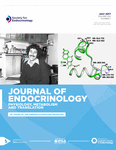Testosterone: a vascular hormone in health and disease
- 1Department of Human Metabolism, Medical School, The University of Sheffield, Sheffield S10 2RX, UK
2Robert Hague Centre for Diabetes and Endocrinology, Barnsley Hospital NHS Foundation Trust, Gawber Road, Barnsley S75 2EP, UK
- (Correspondence should be addressed to T H Jones; Email: hugh.jones{at}nhs.net)
-
Figure 1
Testosterone therapy improves angina threshold in men with chronic stable angina. English et al. (2000b) demonstrated that time to 1 mm ST-segment depression following exercise is greatly increased in the testosterone-treated group compared with the placebo group at baseline and at weeks 6 and 14 (A). In addition, a significant correlation is observed between baseline bioavailable testosterone levels and change in response to exercise-induced cardiac ischaemia (B).
-
Figure 2
The vascular response to testosterone is enhanced in patients with the lowest baseline levels. Pugh et al. (2003) indicated that response to testosterone treatment in cardiac index (A) and systemic vascular resistance (B) is significantly greater in subjects with lower endogenous androgens at baseline. The results are presented as patients with bio-available testosterone levels either above or below the median concentration of 4.57 nmol/l (normal range 2.5–11.9 nmol/l).
-
Figure 3
Potential mechanisms by which testosterone influences vascular reactivity. Endothelium-independent mechanisms of testosterone are considered to occur primarily via the inhibition of voltage-operated Ca2+ channels (VOCCs) and/or activation of K+ channels (KCs) on smooth muscle cells (SMCs). Testosterone shares the same molecular binding site as nifedipine on the α1-C subunit of L-type Ca2+ channels to cause channel blockade at physiological concentrations, thus restricting Ca2+ influx and inducing vasodilation (1). Some reports suggest that pharmacological concentrations of testosterone can activate Ca2+ channel opening and induce vasoconstriction through enhanced Ca2+ influx. Alternatively, testosterone activates voltage-operated K+ channels and/or large-conductance, Ca2+-activated K+ channels, increasing intracellular K+ efflux to induce hyperpolarisation and subsequent vasorelaxation (2). Testosterone may also inhibit intracellular Ca2+ influx via store-operated Ca2+ channels (SOCCs) by blocking response to prostaglandin F2α (PGF2α) (3). Endothelium-dependent actions of testosterone may be long-term genomic and non-genomic effects. Testosterone increases the expression of endothelial nitric oxide synthase (eNOS) and enhances nitric oxide (NO) production (4). Whether these actions are via direct androgen receptor binding, aromatisation to oestradiol and oestrogen receptor activation, or interaction with alternative intracellular signalling pathways remains unknown. Additionally, testosterone treatment has been shown to increase eNOS activity by enhancing phosphorylation potentially via the non-genomic activation of intracellular signalling pathways and Ca2+ influx (5). Increased NO acts on SMCs to induce vasorelaxation by activating cGMP, which in turn activates cGMP-dependent protein kinases (PKG) (6). PKG phosphorylates and activates sarcoplasmic reticulum Ca2+-ATPase (SERCA), which increases the uptake of Ca2+ into the superficial sarcoplasmic reticulum (SR) and therefore decreases global cell Ca2+. PKG also increases Ca2+ release into the submembrane space where the activation of K+ channels ensues and PKG may additionally inhibit Ca2+ channel activity directly to cause vasorelaxation. T, testosterone.
-
Figure 4
The vasodilatory actions of testosterone occur via L-type Ca2+ channel modulation. Scragg et al. (2004) demonstrated an inhibitory effect of testosterone over time on Ca2+ channel currents recorded in HEK293 cells stably transfected with the α1-C subunit of a cloned human cardiovascular L-type Ca2+ channel and rat aortic smooth muscle cell line A7r5 expressing native L-type Ca2+ channels (A). Hall et al. (2006) reported a dose-dependent reduction in K+-evoked Ca2+ increase in A7r5 cells. Nifedipine had no further effects on testosterone response, while pimozide further decreased the response, suggesting an L-type rather than a T-type Ca2+ channel action of testosterone (B). Scragg et al. (2007) further demonstrated that HEK293 cells transfected with the α1-C subunit of the L-type Ca2+ channel containing a point mutation (T1007Y) prevent the inhibitory effects of both nifedipine and testosterone on Ca2+ currents compared with cells transfected with the wild-type subunits (C). The authors therefore demonstrate that testosterone acts at the nifedipine-binding site to elicit L-type Ca2+ channel inhibition and subsequent vasodilatation.
-
Figure 5
Potential cell-specific anti-inflammatory effects of testosterone. Androgens are known anti-inflammatory agents, but the specific actions of testosterone on vascular and immune cells have not been inconsistent. Testosterone has been shown, however, to reduce pro-inflammatory cytokine production and adhesion molecule expression in a number of athero-relevant cell types including monocytes, macrophages, endothelial cells, smooth muscle cells and foam cells. Testosterone may also inhibit the formation of foam cells (open triangle). IL, interleukin; TNF, tumour necrosis factor; MCP, monocyte chemoattractant protein; ICAM, intracellular adhesion molecule; VCAM, vascular cell adhesion molecule; LOX-1, lectin-like oxidised LDL receptor-1; SR-B1, scavenger receptor-B1. *Effects also observed with DHT.
- © 2013 Society for Endocrinology











